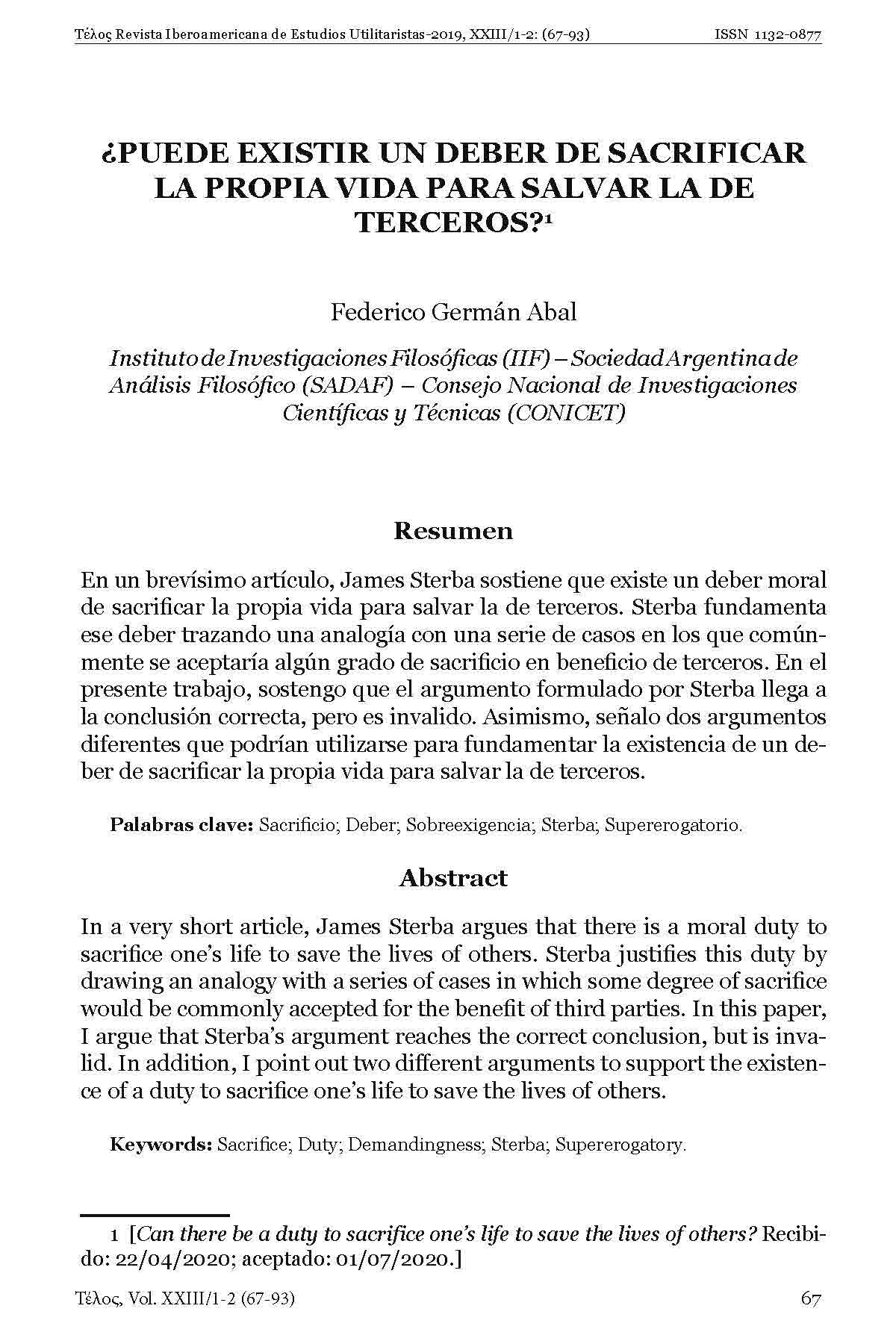¿Puede existir un deber de sacrificar la propia vida para salvar la de terceros?
plugins.themes.xejournal.article.main
Resumo
En un brevísimo artículo, James Sterba sostiene que existe un deber moral de sacrificar la propia vida para salvar la de terceros. Sterba fundamenta ese deber trazando una analogía con una serie de casos en los que comúnmente se aceptaría algún grado de sacrificio en beneficio de terceros. En el presente trabajo, sostengo que el argumento formulado por Sterba llega a la conclusión correcta, pero es invalido. Asimismo, señalo dos argumentos diferentes que podrían utilizarse para fundamentar la existencia de un deber de sacrificar la propia vida para salvar la de terceros.
Palavras-chave:
plugins.themes.xejournal.article.details
Referências
Ackeren, Marcel van & Kühler, Michael: “Ethics on Edge? Moral Demandingness and Ought Implies Can”. Preprints and Working Papers of the Centre for Advanced Study in Bioethics, (2015a). <http://dx.doi.org/10.4324/9781315740812-1>
Ackeren, Marcel van & Kühler, Michael: “Kant and Moral Demandingness”. Ethical Theory and Moral Practice, 18, (2015b), págs. 75-89. <http://dx.doi.org/10.1007/s10677-014-9510-3>
Ackeren, Marcel van & Archer, Alfred: “Self-Sacrifice and Moral Philosophy”. International Journal of Philosophical Studies, Vol. 26, No. 3, (2018), págs. 1-7. <http://dx.doi.org/10.1080/09672559.2018.1489638>
Archer, Alfred: “Supererogation, Sacrifice, and the Limits of Duty”. The Southern Journal of Philosophy, Vol. 54, Issue 3, (2016), págs. 333-354. <http://dx.doi.org/10.1111/sjp.12176>
Ashford, Elizabeth: “The Demandingness of Scanlon’s Contractualism”. Ethics, Vol. 113, No. 2, January, (2003), págs. 273-304. <http://dx.doi.org/10.1086/342853>
Braddock, Matthew: “Defusing the demandingness objection”. Journal of Social Philosophy, Vol. 44, No. 2, Summer, (2013), págs. 169-191.
Crisp, Roger: “Supererogation and Virtue”. Oxford Studies in Normative Ethics, Vol. 3, (2013), págs. 13-34. <http://dx.doi.org/10.1093/acprof:oso/9780199685905.003.0002>
Cullity, Garrett: The Moral Demands of Affluence. Oxford, Clarendon UP, 2004. <http://dx.doi.org/10.1093/0199258112.001.0001>
Darwall, Stephen: The Second Person Standpoint. Cambridge, Harvard UP, 2006.
De Maagt, Sem: “Reflective Equilibrium and Moral Objectivity”. Inquiry, Vol. 60, No. 5, (2017), págs. 443-465. <http://dx.doi.org/10.1080/0020174X.2016.1175377>
Doggett, Tyler: “Recent Work on the Ethics of Self-Defense”. Philosophy Compass, Vol. 6, Issue 4, April, (2011), págs. 220-233. <http://dx.doi.org/10.1111/j.1747-9991.2010.00382.x>
Farrell, Martín: “Supererogación y Deber”. Análisis Filosófico, Vol. 4, No. 1, (1984), págs. 37-43.
Farrell, Martín: Enseñando Ética. Buenos Aires, Editorial Universidad de Palermo, 2015.
Ferry, Michael: “Does Morality Demand Our Very Best? Moral Prescriptions and the Line of Duty”. Philosophical Studies, Vol. 165, Issue 2, (2013), págs. 573-589. <http://dx.doi.org/10.1007/s11098-012-9968-6>
Frowe, Helen: Defensive Killing. Oxford, Oxford UP, 2014. <http://dx.doi.org/10.1093/acprof:oso/9780199609857.001.0001>
García Gibson, Francisco: “¿Cuánto debemos donar a las agencias humanitarias?: Defensa de una posición moderada”. Revista Latinoamericana de Filosofía, Vol. 39, Issue 2, (2013), págs. 245-271.
Glantz, David & House, Jonathan: When Titans Clashed: How the Red Army Stopped Hitler. Lawrence, University Press of Kansas, 1995.
Goodin, Robert: “Demandingness as a virtue”. The Journal of Ethics, Vol. 13, No. 1, (2009), págs. 1-13. <http://dx.doi.org/10.1007/s10892-007-9025-4>
Heyd, David: Supererogation: Its Status in Ethical Theory. Cambridge, Cambridge UP, 1982.
Heyd, David: “Supererogation”. En The Stanford Encyclopedia of Philosophy. Zalta, Edward (ed.), 2019, <https://plato.stanford.edu/archives/win2019/entries/supererogation/>
Hooker, Brad: Ideal Code, Real World. Oxford, Oxford UP, 2000.
Horgan, Terry & Timmons, Mark: “Untying a Knot from the Inside Out: Reflections on the Paradox of Supererogation”. Social Philosophy and Policy, 27, (2010), págs. 29-63.
Kaufman, Whitley: “Self-defense, Innocent Aggressors, and the Duty of Martyrdom”. Pacific Philosophical Quarterly, 91, (2010), págs. 78-96. <http://dx.doi.org/10.1111/j.1468-0114.2009.01359.x>
McElwee, Brian: “Demandingness objections in Ethics”. The Philosophical Quarterly, Vol. 67, Issue 266, January, (2017), págs. 84–105. <http://dx.doi.org/10.1093/pq/pqw020>
McMahan, Jefferson: “Moral Intuition”. En The Blackwell Guide to Ethical Theory. LaFollete, Hugh (ed.), Chichester, Blackwell, 2000.
McMahan, Jefferson: The Ethics of Killing: Problems at the Margins of Life. Oxford, Oxford UP, 2002.
McMahan, Jefferson: “Liability, Proportionality, and the Number of Aggressors”. En The Ethics of War. Bazargan, Saba and Rickless, Samuel (eds.), New York, Oxford UP, 2017.
Mulgan, Tim: The Demands of Consequentialism. Oxford, Oxford UP, 2001.
Norcross, Alastair: “Reasons without Demands: Rethinking Rightness”. En Contemporary Debates in Moral Theory. Dreier, James (ed.), Malden MA, Blackwell, 2006.
Otsuka, Michael: “Killing the Innocent in Self-Defense”. Philosophy and Public Affairs, Vol. 23, No. 1, (1994), págs. 74–94. <http://dx.doi.org/10.1111/j.1088-4963.1994.tb00005.x>
Quong, Jonathan: “Killing in self-defense”. Ethics, 119, (2009), págs. 507-537. <http://dx.doi.org/10.1086/597595>
Singer, Peter: “Famine, Affluence, and Morality”. Philosophy and Public Affairs, 1, No. 2, Spring, (1972), págs. 229-243. <http://dx.doi.org/10.4324/9781315254210-1>
Sachdeva, S., Iliev, R., Ekhtiari, H. & Dehghani, M.: “The Role of Self-Sacrifice in Moral Dilemmas”. PLoS ONE, 10 (6), (2015). <http://dx.doi.org/10.1371/journal.pone.0127409>
Sandberg, Joakim & Juth, Niklas: “Ethics and Intuitions: A Reply to Singer”. The Journal of Ethics, Vol. 15, No. 3, September, (2011), págs. 209-226. <https://doi.org/10.1007/s10892-010-9088-5>
Scheffler, Samuel: The Rejection of Consequentialism. Oxford, Oxford UP, 1994. <http://dx.doi.org/10.1093/0198235119.001.0001>
Sobel, David: “The Impotence of the Demandingness Objection”. Philosophers Imprint, Vol. 7, No. 8, September, (2007). <http://dx.doi.org/10.1093/acprof:oso/9780198712640.003.0013>
Sterba, James: “A Moral Obligation to Sacrifice Our Lives?”. Journal of Social Philosophy, Vol. 44, No. 2, (2013), págs. 108-109. <http://dx.doi.org/10.1111/josp.12015>
Swanton, Christine: “Virtue Ethics and the Problem of Demandingness”. En The Problem of Moral Demandingness. Chappell, Tim (ed.), London, Palgrave, 2009.
Thomson, Judith Jarvis: “Self-Defense”. Philosophy and Public Affairs, Vol. 20, No. 4, (1991), págs. 283–310
Urmson, James Opie: “Saints and Heroes”. En Moral Concepts. Feinberg, Joel (ed.), Oxford, Oxford UP, 1969.
Williams, Bernard: “Una crítica del Utilitarismo”. En Utilitarismo: Pro y Contra. Smart, John Jamieson Carswell & Williams, Bernard (eds.), Madrid, Tecnos, 1981.
plugins.generic.recommendByAuthor.heading
- Federico German Abal, El utilitarismo y el valor de la objetividad , Télos: v. 20 n. 2 (2015)







